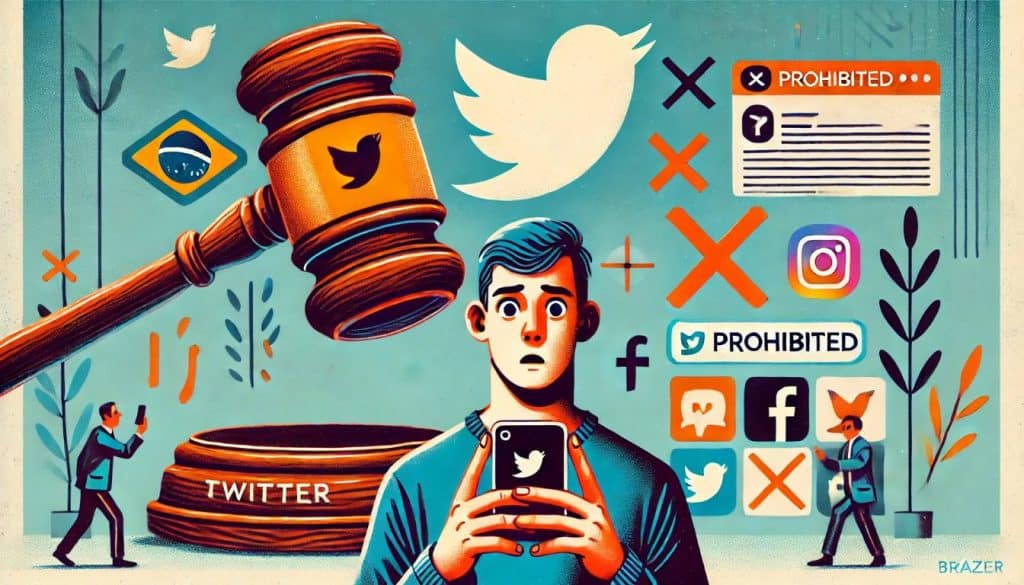Brazil is making headlines with its recent X app ban, a dramatic move that has sent shockwaves through the world news. A Brazilian judge has ordered tech giants Apple and Google to prevent downloads of the controversial X app, previously known as Twitter, following escalating tensions between Elon Musk and the Brazilian judiciary. This ruling not only restricts access to the app but also imposes hefty fines for users attempting to bypass these restrictions using virtual private networks (VPNs). In this article, we’ll delve into the details of this ruling, its implications for users and tech companies alike, and what it means for internet freedom in Brazil.
Contenido
X App Ban Overview
The Judge’s Ruling
On August 30, 2024, Brazilian Supreme Court Justice Alexandre de Moraes issued a sweeping order to block access to X across Brazil. This decision stemmed from Musk’s refusal to comply with earlier court directives requiring the platform to suspend certain accounts accused of spreading misinformation and hate speech. The judge emphasized that X must appoint a legal representative in Brazil—something Musk failed to do after closing the company’s local office amid ongoing legal disputes.
Justice Moraes’ ruling didn’t stop there; he mandated that both Apple and Google must prevent any new downloads of the X app within Brazil. This marks a significant escalation in an already tense relationship between Musk and Brazilian authorities. As noted by various sources including The New York Times, this situation highlights broader concerns over content moderation practices on social media platforms.
Implications for Users
For everyday users in Brazil, this X app ban means they can no longer access one of their most popular social media platforms without facing potential penalties. Those who attempt to use VPNs to circumvent these restrictions will be hit with staggering fines—upwards of $9,000 per day! This hefty price tag could deter many from trying to maintain their access to X.
The implications extend beyond just financial penalties; it raises questions about free speech and digital rights in Brazil. Many Brazilians rely on platforms like X for communication, especially during political campaigns or public discourse. By blocking access outright, critics argue that authorities are undermining democratic principles and stifling voices online.
| Aspect | Details |
|---|---|
| Judge | Alexandre de Moraes |
| Date Issued | August 30, 2024 |
| Fines for VPN Use | ~$9,000 daily |
| Download Restrictions | Enforced on Apple & Google |
Impact on Google and Apple
Download Restrictions
As part of Justice Moraes’ order, both Apple and Google are now tasked with preventing any further downloads of the X app within Brazil’s borders. This creates a logistical challenge for these tech giants as they must navigate not only compliance with Brazilian law but also user expectations globally.
For Apple and Google, complying with such orders can set a precedent regarding how they handle similar demands from governments worldwide. While both companies have faced scrutiny over their roles as gatekeepers in digital content distribution before, this situation underscores a growing trend where governmental authority clashes directly with corporate interests in technology.
Compliance Challenges
Compliance poses significant challenges for both companies—not just operationally but also ethically. They need to balance adherence to local laws while maintaining their global standards around freedom of expression and user privacy.
Moreover, there’s an economic angle here too: Brazil represents one of the largest markets for mobile applications in Latin America. Losing access could mean substantial revenue losses not just from downloads but also from advertising opportunities linked with active user engagement on platforms like X.
Challenges Faced:
- Navigating local laws vs global policies
- Potential revenue loss
- User backlash against compliance measures
VPN Use and Fines
Understanding the $9k Daily Fine
One of the more controversial aspects of Justice Moraes’ ruling is his directive concerning VPN usage among Brazilians seeking continued access to X despite its ban. The fine imposed—approximately $9,000 per day—serves as both a deterrent against non-compliance and a stark warning about government reach into personal internet usage.
This fine structure raises eyebrows internationally as well; it suggests an aggressive approach toward regulating digital behavior at home while potentially setting dangerous precedents abroad regarding internet freedoms. For many users who see VPNs as essential tools for privacy protection online—a right increasingly recognized worldwide—the prospect of facing such severe penalties feels oppressive.
Enforcement of the Ruling
Enforcement mechanisms remain somewhat murky at this point; how exactly will authorities monitor VPN use? Will there be mass surveillance or targeted investigations? These questions linger ominously over Brazilian netizens who may feel trapped between wanting access to vital communication channels like X while fearing punitive measures against them if they try circumventing blocks put in place by their government.
Additionally, enforcement efforts might inadvertently lead many users back into less secure online environments or even push them towards unregulated platforms where accountability is minimal compared to established services like X that operate under stricter guidelines albeit contentious ones at times.
In summary, while Justice Moraes’ ruling aims at enforcing compliance among tech giants regarding local laws surrounding misinformation control—and reflects broader global trends toward tightening regulations—it simultaneously opens up discussions about individual rights versus state control over digital spaces.


